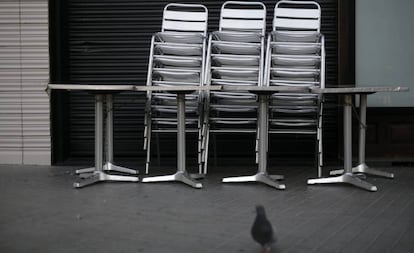Shutters come down on Barcelona’s bars as coronavirus restrictions bite
EL PAÍS speaks to workers in the hostelry sector on the day that the regional government’s closures across Catalonia were backed by the courts


Thursday night was an anxious time for restaurateurs in Catalonia. The day before they had found out that they were going to have to close for at least two weeks, a measure that forms part of a new package of strict restrictions approved by the regional government in a bid to slow the spread of the coronavirus.
In just 48 hours, Luz Tamara and Edu Cruz, the owners of Sur Café in Barcelona, had to manage the closure of their establishment. “And what am I going to do with what I’ve already got in the fridges for this week?” asks Tamara. “It’s produce that will go to waste.”
The uncertainty about what was going to happen in the northeastern region dragged on until past midnight, until the Catalan High Court finally gave the restrictions its backing. “With all of the confusion, I called the Mossos d’Esquadra [regional police] and [emergency number] 112,” Tamara explains. “They told me they knew as much as I did, and that I should watch the news to find out whether we would end up having to close.”
Why me and not the buses or the Metro, which are always full?Jing Cui, bar owner in Barcelona
“Right up until the last minute we didn’t know anything,” complains Marc Ferrer and his wife, Ceci Nieto. “This isn’t right. Closing from one day to the next means losing at least 40% of what I have invested in produce,” he says. The couple met with their employees at the Can Pascual restaurant in the Catalan capital first thing on Friday, still awaiting the court’s decision, which finally came on Friday morning and gave legal backing to the measures.
The suspension of activity in the sector could end up affecting 200,000 workers in Catalonia. So far this year, a total of 116,000 employees in the region have been put on the central government’s ERTE furlough scheme.
Most establishments have opted to continue selling drinks and other products to take away, but this option is not sufficient to cover costs, explains Jing Cui. She and her husband took over a bar called Mercadillo in Barcelona back in June. The worst thing, she explains, has been the uncertainty caused by the pandemic. “One day you think things have got a bit better but then they get worse again,” explains Jing. She says that closing bars is a ridiculous move. “Why me and not the buses or the Metro, which are always full?” she asks.
The comparison with public transportation is one that comes up often among those who were interviewed for this article. Except, that is, in the case of David Castellanos, the manager of a bar named Frankfurt Rosellón. Castellanos believes that the measures are necessary in order to improve the health situation. But he does complain that the closure came as a surprise. “We knew there would be another wave in the fall,” he says. “But this took us by surprise because it came from one day to the next.”
In October, Cruz and Tamara had managed to recover 60% of the usual revenue for their café. They had to fight tooth and nail to keep the business going after the lockdown in spring, and managed to do so thanks to the efforts of their family and a government loan that they were granted. Now they expect their problems to get worse, and their main concern is how the fall in domestic income could affect the education of their two children. For this academic year, they have already had to change the schools in which their kids were enrolled.
English version by Simon Hunter.
Tu suscripción se está usando en otro dispositivo
¿Quieres añadir otro usuario a tu suscripción?
Si continúas leyendo en este dispositivo, no se podrá leer en el otro.
FlechaTu suscripción se está usando en otro dispositivo y solo puedes acceder a EL PAÍS desde un dispositivo a la vez.
Si quieres compartir tu cuenta, cambia tu suscripción a la modalidad Premium, así podrás añadir otro usuario. Cada uno accederá con su propia cuenta de email, lo que os permitirá personalizar vuestra experiencia en EL PAÍS.
¿Tienes una suscripción de empresa? Accede aquí para contratar más cuentas.
En el caso de no saber quién está usando tu cuenta, te recomendamos cambiar tu contraseña aquí.
Si decides continuar compartiendo tu cuenta, este mensaje se mostrará en tu dispositivo y en el de la otra persona que está usando tu cuenta de forma indefinida, afectando a tu experiencia de lectura. Puedes consultar aquí los términos y condiciones de la suscripción digital.








































